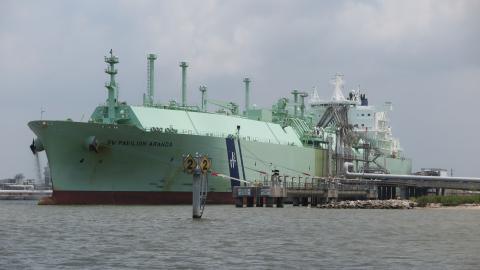Recent news of John Kerry’s departure from the Biden team is a reminder of the baneful influence he and his progressive friends have continued to exert on U.S. energy policy. This month that faction renewed their attacks on fossil fuel by urging the Biden administration to slow down or halt approvals of new liquified natural gas (LNG) export licenses. This initiative should be seen for what it is: an attempt to constrain the free market economy and accelerate the end of the fossil fuel economy. Even more puzzling is that constraining LNG exports would likely increase, not decrease, global carbon emissions.
As the United States faces crises in the Middle East, Europe, and Asia, Washington should prioritize economic and energy stability to resist these challenges. Growing U.S. LNG exports has been key to keeping European economies stable, helping Ukraine resist Russian President Vladimir Putin’s aggression, and maintaining stable energy prices in the Pacific Rim.
Indeed, last year the United States became the world’s largest LNG exporter, surpassing Qatar and Australia. U.S. exports rose 14.7 percent to a record 88.9 million metric tons (MT), or 8.6 billion cubic feet per day.
After the shock of the 1972 Arab Oil Embargo, America spent decades eliminating its dependence on foreign energy suppliers to become the world’s leading energy producer. Energy independence, ample supplies, and lower prices have also been the secret to reenergizing U.S. industrial capacity. Meanwhile, the country’s vast energy resources have provided much-needed stability at home while helping allies, particularly in Europe after Russia’s full-scale invasion of Ukraine in 2022.
Despite increasing production, the United States has seen one of the most significant decreases in carbon emissions of any industrialized country, now 17 percent below 2005 levels and falling while the economy continues to grow. A key reason why this occurred is because natural gas has been replacing coal in energy production. More energy and fewer emissions are a testament to American innovation and ingenuity. So America is not the renegade polluter demonized by progressives; it is the bar against which other countries should be judged, lest we forget that emissions from China and India far outpace the rest of the developed world combined.
However, the Biden administration is now reviewing how it approves natural gas exports, with some reporting that the administration is planning to curtail or even limit additional applications for new or increased capacity.
The theory is that exporting natural gas perpetuates the use of hydrocarbons. If America did not export such energy, other countries would emit less. This theory, however, is flawed. American LNG is not a choice of last resort; it is the world’s first choice, and its absence would undermine allies and increase the cost of goods and commodities. Furthermore, without American LNG, other countries’ emissions would actually increase because they would be forced to utilize fuels like coal or fuel oil that have higher carbon content. The history of the last few years demonstrates this inconvenient truth.
Regarding the national interest, exporting LNG to allies and others seeking to reduce emissions seems clear. U.S. allies with limited natural resources—such as Europe, Taiwan, Korea, and Japan—are unlikely to disagree.
Moreover, if the Biden administration constrains the export of LNG, it would distort U.S. markets and cause natural gas prices to fall at home. Such a move would likely mean the U.S. economy sees less electrification—for example, fewer heat pumps and renewables may be installed.
If America’s long-term goal is decarbonization, the government should be agnostic about how that goal is achieved. The glide path toward net-zero emissions requires a realistic assessment of the business case for achieving the desired outcome. To understand why, one need only look at the disastrous path of the German economy since it chose to accelerate the energy transition before alternatives to fossil fuels could become a reliable and cost-effective alternative. Instead of repeating this mistake, the markets should be allowed to find the answers to this challenge.
Significant bipartisan agreement exists as all Americans generally agree that the country requires stable, reliable, and affordable energy. Policymakers should therefore keep the end goal in mind and provide a stable market for investment. Washington’s whiplash, such as the latest idea to intervene in the export market, unnerves investors who abhor risk. Government policy needs stability and regulatory certainty to see private capital flow into energy production and infrastructure. The U.S. industry has planned $290 billion in new LNG investment over the next decade to increase capacity by 70 percent. The administration’s review of licensing jeopardizes this new investment, and making such a mistake would risk undermining the decades of effort America has made to achieve energy independence.
For today, an all-of-the-above approach to energy is the only realistic option for what should be obvious reasons. Economic stability and market efficiency in the U.S. and among allies at a time of two major wars, the threat of China toward allies in the Pacific Rim, and a realistic path toward net zero all require ample American LNG supplies to have a chance of success.














